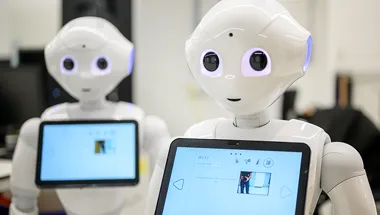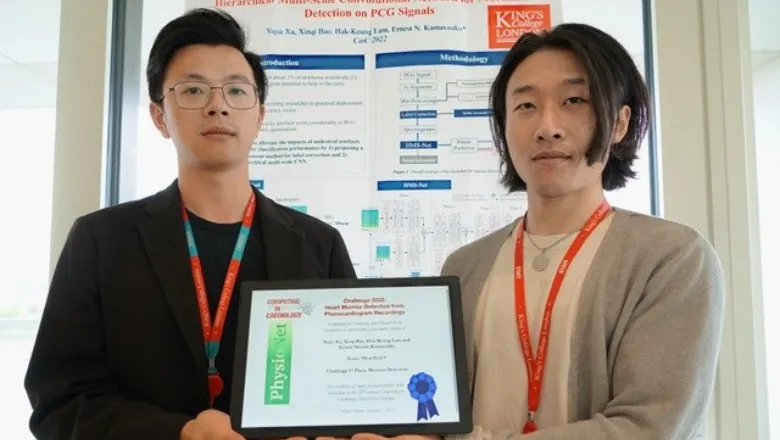
Dr Hak-Keung Lam
Reader
- Associate Editor of IEEE Transactions on Fuzzy Systems, International Journal of Fuzzy Systems, Journal of Intelligent Learning Systems and Applications
Research interests
- Engineering
Biography
Dr H K. Lam's research interests include fuzzy control systems, neural networks, chaotic synchronisation and genetic algorithms. H K Lam’s research interests include control theory, intelligent systems, computational intelligence, machine learning and their applications. He has authored/co-authored over 480 publications (as of 2023) on these topics.
His citation information can be found in the links below:
He serves as an area editor/guest editor/editorial board member for a number of journals, a program committee member, an international advisory board member, an invited session chair, publication chair and programme chair for various international conferences, and a reviewer for various books, international journals and international conferences. He has organised a number of special sessions for international conferences.
He was an associate editor for IEEE Transactions on Circuits and Systems II: Express Briefs and is an associate editor for IEEE Transactions on Fuzzy Systems, IET Control Theory and Applications, International Journal of Fuzzy Systems, Neurocomputing and Nonlinear Dynamics.
He is a co-editor for two edited volumes: Control of Chaotic Nonlinear Circuits (World Scientific, 2009) and Computational Intelligence and Its Applications (World Scientific, 2012), and the author/co-author of the books Stability Analysis of Fuzzy-Model-Based Control Systems (Springer, 2011), Polynomial Fuzzy Model Based Control Systems (Springer 2016), Interval Type-2 Fuzzy-Model-Based Systems (Springer, 2016).
He is an IEEE Fellow for contributions to analysis and design of fuzzy model-based control systems. He has been named a Highly Cited Researcher (Clarivate Web of Science) since 2018.
Research interests
Control Theory and Intelligent Systems
- Fuzzy modelling
- Fuzzy-model-based control
- Neural network-based control
- Control methods: PID control, state-feedback control, fuzzy logic control, time-delayed control, sampled-data control, networked control, fault-tolerant control, sliding-mode control, switching control
- Stability/performance/robustness analysis
- Lyapunov stability
Computational Intelligence
- Fuzzy logic, type-1 fuzzy sets, type-2 fuzzy sets, interval type-2 fuzzy sets
- Neural networks (NN)
- Neural-fuzzy network (NFN)
- Support vector machine (SVM)
- Meta-heuristic optimization algorithm, evolutionary algorithms, genetic algorithm, swarm intelligence, particle swarm optimisation algorithm
Machine Learning
- Deep learning
- Deep structured network: feedback forward neural network, variable-weight neural network, variable-structure neural network, graph neural network (GNN), convolutional neural network (CNN), recurrent neural network (RNN), Long-short term memory (LSTM), generative adversarial network (GAN)
- Reinforcement learning
- Data-driving modelling/control
- Explainable artificial intelligence (XAI), machine explainability
Biomedical Applications
- Classification of EMG/ECG/EEG signal
- Catheter classification and detection
- Seizure phases and types, hand gestures, brain signals
- Classification of COVID-19
- Detection of non-erosive reflux disease
- Depth estimation of hard inclusions in soft tissue
Engineering Applications
- Control of autonomous vehicles, bolt tightening, continuum manipulators, inverted pendulum, mobile robots, motors, power converters, robot arms, vehicle suspension systems
- Ball bonding inspections
- Hand-written/voice command recognition
- Classification of material textures
- Path planning for robot navigation
More information
Research

Signals & Control
Applying signal processing and control to generate adaptive intelligent systems.

Data-Centric Engineering
Applying machine learning to engineering challenges

Centre for Robotics Research
The group develops solutions to critical challenges faced in society where robot-centric approaches can improve outcomes.
News
Detecting heart defects in babies and children
A team from the Department of Engineering has scooped first prize in the annual PhysioNet Computing in Cardiology challenge.

King's Engineer Dr Hak-Keung Lam named in Highly Cited Researchers list for third year running
Dr Hak-Keung Lam, Reader in the Department of Engineering, has been named by the Web of Science Group as Highly Cited Researcher for 2020 under the category...

King's Engineer Dr Hak-Keung Lam named Fellow of the Institute of Electrical and Electronics Engineers
Dr Hak-Keung Lam, Reader in the Department of Engineering, has been named a Fellow of the Institute of Electrical and Electronics Engineers (IEEE) in...

Reader in Informatics Dr Hak-Keung Lam named in Highly Cited Researchers List
Dr Hak-Keung Lam, Reader in the Department of Informatics, has been named in the 2018 Clarivate Analytics Highly Cited Researchers List. The annual list...

Informatics academic publishes monograph
Dr H.K. Lam, from the Department of Informatics, a member of the Centre for Robotics Research (CoRe), has published a monograph entitled “Polynomial Fuzzy...

Research

Signals & Control
Applying signal processing and control to generate adaptive intelligent systems.

Data-Centric Engineering
Applying machine learning to engineering challenges

Centre for Robotics Research
The group develops solutions to critical challenges faced in society where robot-centric approaches can improve outcomes.
News
Detecting heart defects in babies and children
A team from the Department of Engineering has scooped first prize in the annual PhysioNet Computing in Cardiology challenge.

King's Engineer Dr Hak-Keung Lam named in Highly Cited Researchers list for third year running
Dr Hak-Keung Lam, Reader in the Department of Engineering, has been named by the Web of Science Group as Highly Cited Researcher for 2020 under the category...

King's Engineer Dr Hak-Keung Lam named Fellow of the Institute of Electrical and Electronics Engineers
Dr Hak-Keung Lam, Reader in the Department of Engineering, has been named a Fellow of the Institute of Electrical and Electronics Engineers (IEEE) in...

Reader in Informatics Dr Hak-Keung Lam named in Highly Cited Researchers List
Dr Hak-Keung Lam, Reader in the Department of Informatics, has been named in the 2018 Clarivate Analytics Highly Cited Researchers List. The annual list...

Informatics academic publishes monograph
Dr H.K. Lam, from the Department of Informatics, a member of the Centre for Robotics Research (CoRe), has published a monograph entitled “Polynomial Fuzzy...

